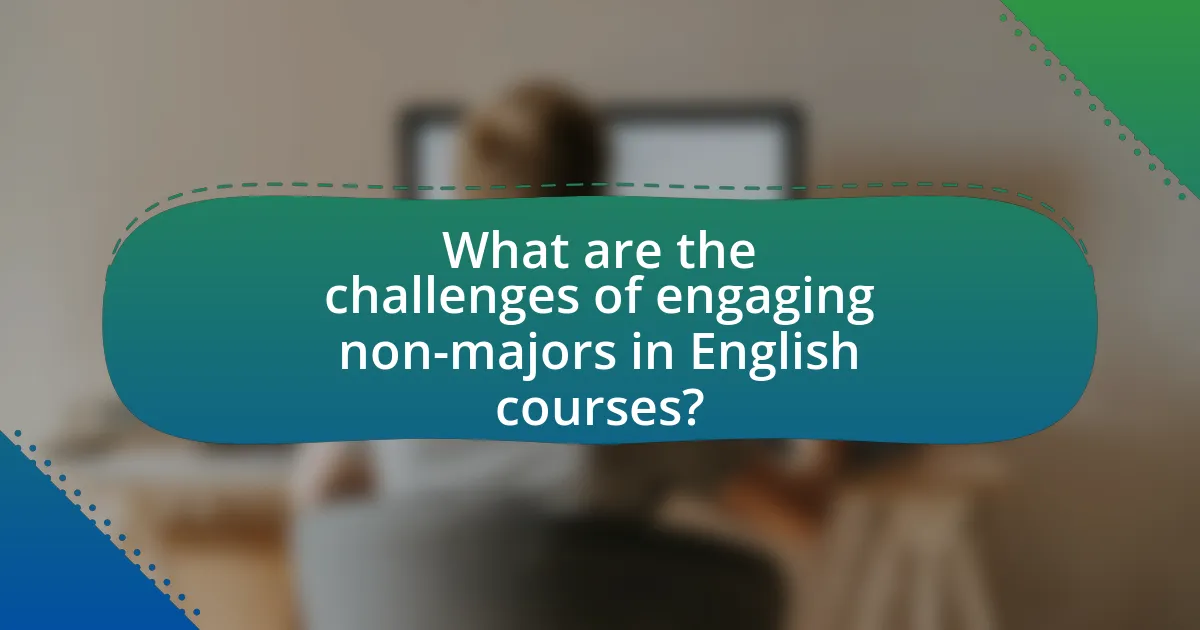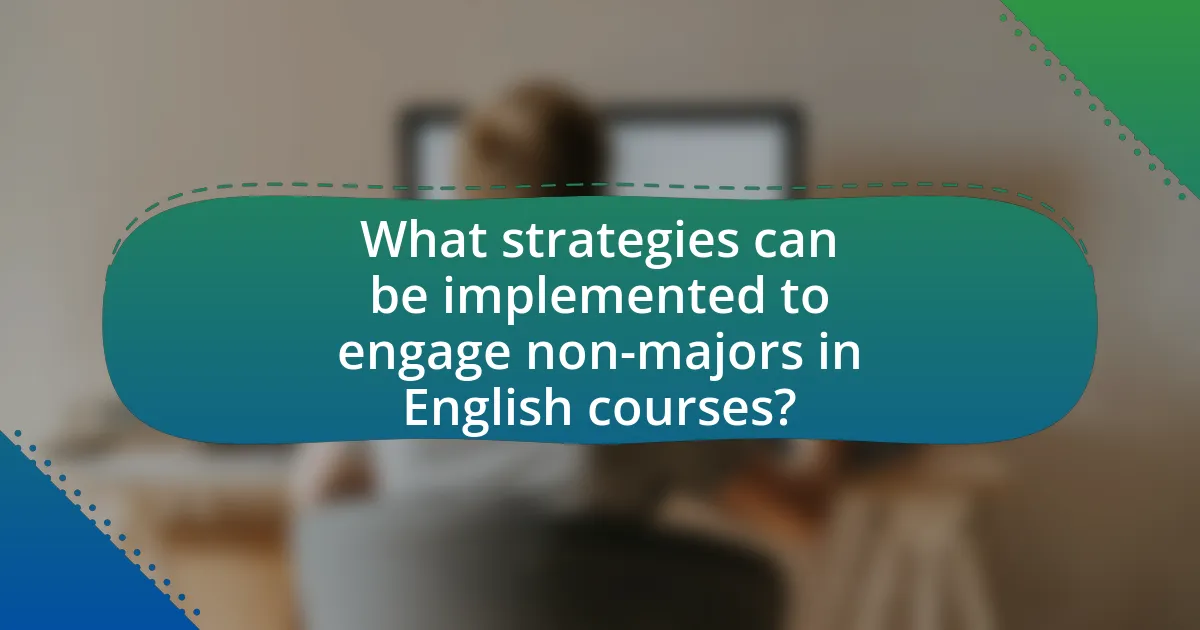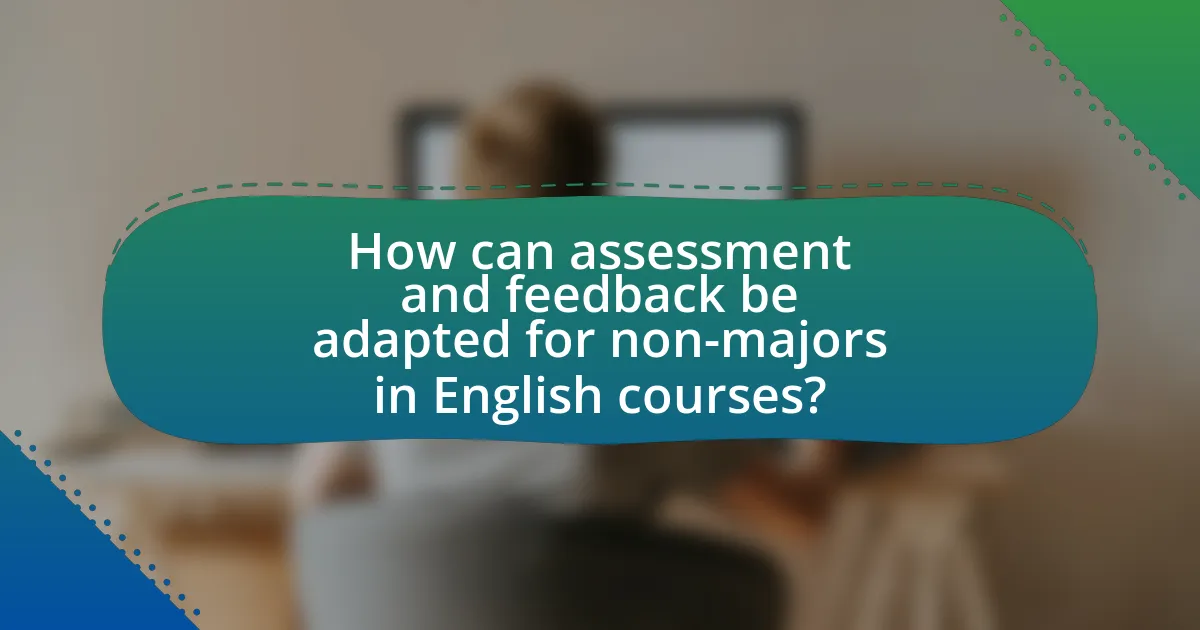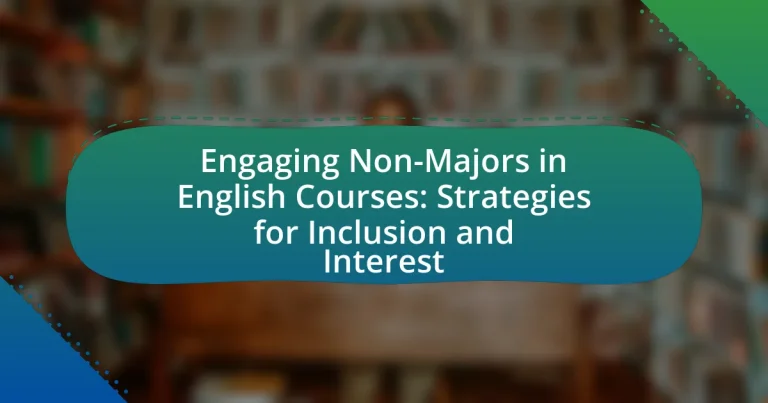The article focuses on the challenges and strategies for engaging non-majors in English courses. It highlights issues such as lack of intrinsic motivation, perceived irrelevance of course material, and varying levels of language proficiency that hinder participation. The importance of including non-majors is emphasized, as their diverse perspectives enrich classroom discussions and enhance critical thinking skills. The article also outlines effective teaching methods, assessment strategies, and resources that can be utilized to create an inclusive and supportive learning environment for non-major students, ultimately fostering greater engagement and academic success.

What are the challenges of engaging non-majors in English courses?
Engaging non-majors in English courses presents several challenges, primarily due to a lack of intrinsic motivation and perceived relevance of the material. Non-majors often view English courses as unrelated to their primary fields of study, leading to disengagement. Research indicates that students are more likely to engage when they see direct applications of course content to their personal or professional lives. Additionally, varying levels of language proficiency among non-majors can create disparities in classroom participation and comprehension, further complicating engagement efforts. These challenges necessitate tailored instructional strategies that connect course material to the diverse interests and backgrounds of non-major students.
Why is it important to include non-majors in English courses?
Including non-majors in English courses is important because it fosters critical thinking and communication skills across diverse disciplines. Non-majors bring varied perspectives that enrich classroom discussions, enhancing the learning experience for all students. Research indicates that interdisciplinary engagement improves overall academic performance; for instance, a study by the Association of American Colleges and Universities found that students who participate in courses outside their major demonstrate higher levels of critical thinking and problem-solving abilities. This inclusion not only benefits non-majors by broadening their skill sets but also cultivates a more inclusive academic environment that values diverse viewpoints.
What unique perspectives do non-majors bring to English courses?
Non-majors bring diverse viewpoints and experiences to English courses, enriching discussions and broadening the scope of analysis. Their varied academic backgrounds often lead to unique interpretations of texts, fostering interdisciplinary connections that enhance critical thinking. For instance, a student majoring in science may approach literary themes through a lens of empirical reasoning, while a business major might analyze character motivations in terms of market dynamics. This diversity not only stimulates engaging conversations but also encourages all students to consider multiple perspectives, ultimately leading to a more comprehensive understanding of the material.
How does inclusion of non-majors enhance the learning environment?
Inclusion of non-majors enhances the learning environment by fostering diverse perspectives and promoting collaborative learning. When non-majors participate in courses, they bring unique viewpoints and experiences that enrich discussions, leading to a more dynamic classroom atmosphere. Research indicates that diverse groups can improve problem-solving and creativity, as highlighted in a study by Page (2007) in “The Difference: How the Power of Diversity Creates Better Groups, Firms, Schools, and Societies.” This diversity encourages students to engage more deeply with the material and with each other, ultimately enhancing critical thinking and communication skills.
What barriers do non-majors face in participating in English courses?
Non-majors face several barriers in participating in English courses, including lack of confidence, perceived irrelevance, and scheduling conflicts. Lack of confidence often stems from previous negative experiences with language learning, leading to anxiety about performance. Perceived irrelevance arises when non-majors believe that English courses do not align with their primary academic or career goals, making them less likely to enroll. Scheduling conflicts can occur due to the demands of their major coursework or work commitments, limiting their availability to attend English classes. These barriers collectively hinder non-majors from engaging fully in English courses.
How do perceptions of English courses affect non-majors’ engagement?
Perceptions of English courses significantly influence non-majors’ engagement by shaping their attitudes and motivations toward the subject. When non-majors view English courses as relevant and beneficial to their personal and professional development, they are more likely to participate actively and invest effort in the coursework. Conversely, if they perceive these courses as irrelevant or overly challenging, their engagement diminishes. Research indicates that students who believe English courses enhance critical thinking and communication skills are more inclined to engage, as evidenced by a study published in the Journal of Educational Psychology, which found that positive perceptions correlate with higher participation rates and improved academic performance among non-majors.
What logistical challenges do non-majors encounter in English courses?
Non-majors encounter several logistical challenges in English courses, primarily related to scheduling conflicts and varying levels of preparedness. Scheduling conflicts arise because non-majors often have to balance courses from their primary fields of study, which may limit their availability for English classes. Additionally, varying levels of preparedness can lead to difficulties in keeping pace with course material, as non-majors may not have the same foundational skills in writing and analysis as their major counterparts. These challenges can hinder their engagement and success in the course.

What strategies can be implemented to engage non-majors in English courses?
To engage non-majors in English courses, instructors can implement strategies such as integrating relevant, real-world topics into the curriculum. This approach makes the material more relatable and applicable to students’ lives, increasing their interest and participation. For instance, incorporating contemporary issues like social media, environmental concerns, or cultural diversity can resonate with students from various disciplines. Research shows that when students see the relevance of course content to their personal and professional lives, their engagement levels rise significantly. Additionally, utilizing interactive teaching methods, such as group discussions, multimedia presentations, and project-based learning, fosters a collaborative environment that encourages non-majors to contribute actively. These strategies not only enhance engagement but also improve overall learning outcomes by making English courses more inclusive and appealing to a broader audience.
How can course content be tailored to attract non-majors?
Course content can be tailored to attract non-majors by incorporating interdisciplinary themes that resonate with diverse interests. For instance, integrating real-world applications, such as analyzing contemporary issues through literature or exploring cultural narratives, can engage students from various backgrounds. Research indicates that courses designed with relevance to students’ lives and career aspirations significantly increase enrollment and participation rates among non-majors. A study by the American Association of Colleges and Universities found that 80% of students prefer courses that connect academic content to real-world scenarios, highlighting the importance of practical relevance in course design.
What themes resonate with non-majors in English literature?
Themes that resonate with non-majors in English literature include identity, belonging, and social justice. These themes are particularly engaging because they reflect universal human experiences and societal issues that non-majors often relate to in their own lives. For instance, studies show that narratives exploring personal identity and cultural heritage can foster a deeper connection among students, as they often seek to understand their own place in the world. Additionally, themes of social justice resonate strongly, as they encourage discussions about equity and representation, which are increasingly relevant in contemporary society. This connection to real-world issues enhances the appeal of literature for non-majors, making it more accessible and meaningful.
How can interdisciplinary approaches enhance non-major engagement?
Interdisciplinary approaches can enhance non-major engagement by integrating diverse perspectives and methodologies, making the content more relatable and applicable to students’ varied interests. For instance, incorporating elements from psychology, sociology, or history into English courses allows non-majors to see the relevance of literary themes in real-world contexts, thereby increasing their motivation to participate. Research indicates that students exposed to interdisciplinary curricula demonstrate higher levels of engagement and retention, as evidenced by a study published in the Journal of Educational Psychology, which found that interdisciplinary learning environments foster critical thinking and collaborative skills among students.
What teaching methods are effective for non-majors in English courses?
Effective teaching methods for non-majors in English courses include active learning strategies, collaborative projects, and real-world applications. Active learning engages students through discussions, peer teaching, and hands-on activities, which have been shown to enhance comprehension and retention. Collaborative projects foster teamwork and communication skills, allowing students to connect course material to their interests. Real-world applications, such as analyzing contemporary texts or media, make the content relevant and relatable, increasing student motivation. Research indicates that these methods improve engagement and learning outcomes for non-majors, as evidenced by studies showing higher participation rates and improved grades in courses utilizing these approaches.
How can active learning strategies be utilized in English courses?
Active learning strategies can be utilized in English courses by incorporating collaborative activities, discussions, and hands-on projects that encourage student participation. For instance, group discussions on literary themes or peer review sessions for writing assignments foster engagement and critical thinking. Research indicates that active learning techniques, such as problem-based learning and role-playing, enhance comprehension and retention of material, making the learning experience more dynamic and inclusive for non-majors. Studies show that students involved in active learning demonstrate higher levels of motivation and achievement, which supports the effectiveness of these strategies in English education.
What role does technology play in engaging non-majors?
Technology plays a crucial role in engaging non-majors by providing interactive and accessible learning experiences. Through tools such as online platforms, multimedia resources, and virtual collaboration, technology enhances participation and interest among students who may not have a strong background in the subject. For instance, studies show that the use of digital storytelling and interactive simulations can significantly increase engagement levels, making the content more relatable and stimulating for non-majors. Additionally, technology facilitates personalized learning paths, allowing students to explore topics at their own pace, which has been linked to improved retention and satisfaction in educational settings.

How can assessment and feedback be adapted for non-majors in English courses?
Assessment and feedback can be adapted for non-majors in English courses by incorporating diverse evaluation methods that align with their varied interests and backgrounds. For instance, using project-based assessments allows students to engage with material in a way that connects to their major or personal interests, fostering relevance and motivation. Additionally, providing formative feedback through peer reviews and collaborative discussions encourages a supportive learning environment, which is particularly beneficial for non-majors who may lack confidence in their writing skills. Research indicates that students who receive timely and constructive feedback are more likely to improve their performance, as highlighted in the study “The Impact of Feedback on Student Learning” by Hattie and Timperley, which emphasizes the importance of feedback in enhancing student outcomes.
What types of assessments are most effective for non-majors?
Formative assessments are the most effective for non-majors, as they provide ongoing feedback and encourage active participation. These assessments, such as quizzes, peer reviews, and reflective journals, allow non-majors to engage with the material in a low-stakes environment, fostering a deeper understanding of the content. Research indicates that formative assessments can enhance student motivation and learning outcomes, particularly in diverse classrooms where students may have varying levels of preparedness and interest. For instance, a study published in the Journal of Educational Psychology found that formative assessments significantly improved student engagement and performance in non-major courses, highlighting their effectiveness in promoting active learning.
How can formative assessments support non-major learning?
Formative assessments can support non-major learning by providing ongoing feedback that helps students identify their strengths and weaknesses in real-time. This continuous evaluation allows non-majors to adjust their learning strategies and focus on areas needing improvement, which is crucial in a subject they may not be familiar with. Research indicates that formative assessments enhance student engagement and motivation, as they create a more personalized learning experience. For instance, a study by Black and Wiliam (1998) found that formative assessment practices significantly improve student achievement across various subjects, including those outside their major.
What feedback methods encourage non-majors to improve?
Feedback methods that encourage non-majors to improve include formative assessments, peer reviews, and personalized feedback. Formative assessments, such as quizzes and reflective journals, provide ongoing insights into student understanding, allowing non-majors to identify areas for improvement. Peer reviews foster collaboration and critical thinking, enabling students to learn from each other’s perspectives. Personalized feedback, tailored to individual strengths and weaknesses, enhances motivation and engagement by making students feel valued and understood. Research indicates that these methods lead to higher retention rates and improved performance among non-majors in English courses, as they create a supportive learning environment that addresses diverse needs.
How can instructors foster a supportive environment for non-majors?
Instructors can foster a supportive environment for non-majors by creating inclusive classroom practices that encourage participation and respect diverse perspectives. Implementing strategies such as collaborative group work, where students from various backgrounds engage in discussions, enhances peer support and builds a sense of community. Research indicates that inclusive teaching methods, like active learning and culturally responsive pedagogy, significantly improve student engagement and retention rates among non-majors. For instance, a study by the American Association of Colleges and Universities found that active learning environments lead to higher satisfaction and performance among students, particularly those who may feel marginalized in traditional settings.
What strategies can be used to build community among students?
To build community among students, implementing collaborative learning strategies is essential. Collaborative learning encourages students to work together on projects, fostering relationships and a sense of belonging. Research indicates that students engaged in collaborative learning report higher levels of satisfaction and connection to their peers (Johnson & Johnson, 2014). Additionally, organizing social events and group activities can enhance interpersonal relationships, as these settings provide informal opportunities for students to interact and bond outside of academic pressures. Creating inclusive environments through diverse group assignments also promotes understanding and respect among students from different backgrounds, further strengthening community ties.
How can instructors address the diverse needs of non-majors?
Instructors can address the diverse needs of non-majors by implementing differentiated instruction tailored to various learning styles and interests. This approach allows educators to create a more inclusive environment by offering multiple pathways for students to engage with the material, such as through collaborative projects, multimedia resources, and varied assessment methods. Research indicates that differentiated instruction can enhance student engagement and achievement, particularly in diverse classrooms, as it acknowledges individual strengths and preferences (Tomlinson, 2001). By actively involving non-majors in the learning process and providing choices, instructors can foster a sense of belonging and relevance, ultimately improving their educational experience.
What are some best practices for engaging non-majors in English courses?
To engage non-majors in English courses effectively, instructors should incorporate relevant, real-world applications of course material. This approach helps students see the value of English in their everyday lives and future careers. For instance, using contemporary literature, media, and topics that resonate with students’ interests can foster engagement. Research indicates that when students connect course content to their personal experiences, their motivation and participation increase significantly. Additionally, collaborative projects and discussions that encourage diverse perspectives can enhance the learning experience, making it more inclusive and stimulating for non-majors.
How can instructors create inclusive syllabi for non-majors?
Instructors can create inclusive syllabi for non-majors by incorporating diverse perspectives, materials, and assessment methods that resonate with a broad range of students. This approach involves selecting texts and resources that reflect various cultures, identities, and experiences, ensuring that all students see themselves represented in the course content. Additionally, instructors should employ varied assessment strategies, such as group projects and creative assignments, to accommodate different learning styles and encourage collaboration among students from diverse backgrounds. Research indicates that inclusive syllabi enhance student engagement and retention, as they foster a sense of belonging and relevance in the course material.
What resources are available to support non-majors in English courses?
Resources available to support non-majors in English courses include tutoring services, writing centers, online learning platforms, and supplemental instructional materials. Tutoring services provide personalized assistance, while writing centers offer guidance on writing skills and assignments. Online learning platforms, such as Coursera or Khan Academy, provide access to English language courses and resources. Supplemental instructional materials, including textbooks and online articles, enhance understanding and engagement with course content. These resources collectively aim to improve the academic experience for non-majors in English courses.




